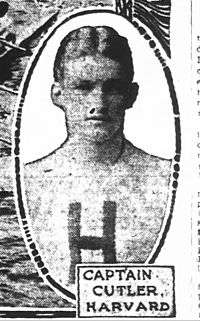Johnny Cutler
John Wilson Cutler (May 12, 1887 – March 18, 1950) was an American college football player.
 Cutler c. 1909 | |
| Harvard Crimson | |
|---|---|
| Position | Quarterback |
| Career history | |
| College | Harvard (1906–1909) |
| Personal information | |
| Born: | May 12, 1887 Bangor, Maine |
| Died: | March 18, 1950 Manhattan, New York |
| Career highlights and awards | |
| |
Early life
Cutler was born on May 12, 1887 in Bangor, Maine.[1] He was one of five sons born to George C. and Mary F. Wilson Cutler. His brothers were Elliott Carr Cutler, a professor at the Harvard Medical School and a surgeon, Robert Cutler, the first National Security Advisor, Roger W. Cutler, a U.S. Navy officer and the husband of Leslie Bradley Cutler, and George C. Cutler Jr.[2]
Playing career
Cutler was a prominent quarterback for the Harvard Crimson football team of Harvard University. He was also a member of the rowing team.[3][4]
He led the 1908 Crimson to a win over Dartmouth.[5][6] He was selected second-team All-American by Walter Camp.[7][8]
Cutler served on the Class Day Committee for the Class of 1909,[9] although he did not graduate from Harvard until 1911.[10]
Personal life
Cutler married Rosalind Fish on October 22, 1910, in Garrison, New York.[11] Rosalind was the daughter of Hamilton Fish II and the sister of Hamilton Fish III, future Representative and Cutler's teammate on the 1908 Championship team. The Cutlers had two sons and three daughters.[1]
During World War I, Cutler was a major with the American Expeditionary Forces.[1]
Business career
Cutler worked for Lee, Higginson & Co. and Kissel, Kinnicutt & Co. in Boston until 1920, when he moved to New York and became a partner at E.B. Smith & Co. He later became a member of Smith Barney & Co. During the 1930s, Cutler served as chairman of the investment bankers' division of the Emergency Unemployment Relief Committee.[1] Cutler was a director of a number of enterprises, including IT&T, The Hoover Company, New York Air Brake, R. Hoe & Company, McKesson & Robbins, Ludlum Steel, Grace National Bank, and Roosevelt Field.
He died in New York on March 18, 1950, at the age of 62.[1]
References
- "John Cutler Dies; Long a Banker, 62". The New York Times. March 19, 1950.
- Wayman, Dorothy G. (October 27, 1940). "Boston's Famous Cutlers in News Again, Robert as City Counsel, Roger as Navy Aviation Officer". The Boston Daily Globe.
- "Harvard Oarsmen Off". Boston Evening Transcript. June 9, 1906.
- "Yale and Harvard Varsity Crews Practicing For Race On Schuylkill". Atlanta Constitution. May 22, 1909. p. 11. Retrieved April 14, 2015 – via Newspapers.com.

- W. H. Edwards. Football Days: Memories of the Game and of the Men behind the Ball. p. 114.
- "TIMELY RALLY WON VICTORY | News | The Harvard Crimson". www.thecrimson.com.
- "Camp's 1908 All-America Selections". Reading Eagle. November 26, 1930.
- "Walter Camp Football Foundation". Archived from the original on 2009-03-30.
- "1909 Class Day Officers | News | The Harvard Crimson". www.thecrimson.com.
- of 1909, Harvard College (1780-) Class (July 1, 1909). "Harvard College Class of 1909 Second Report". Crimson Printing Company – via Google Books.
- of 1909, Harvard College (1780-) Class (July 1, 1909). "Harvard College Class of 1909 Second Report". Crimson Printing Company – via Google Books.